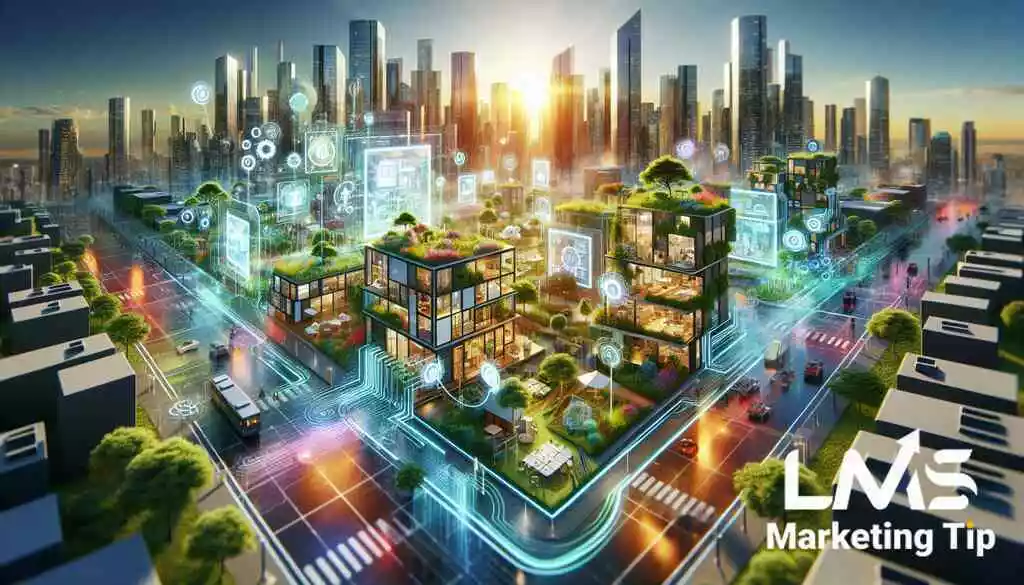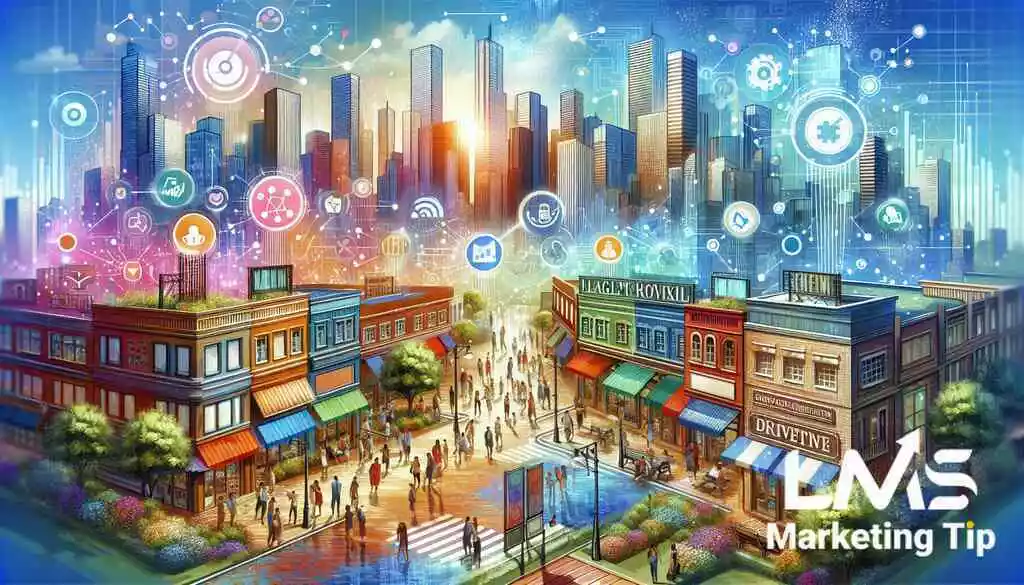
Navigating the New Era of Real Estate Marketing
Understanding Digital Transformation in Real Estate
The digital transformation of real estate has become a pivotal force shaping the industry’s future. Technological advancements have introduced innovative tools that are changing traditional processes. Real estate agents now utilize digital platforms to reach wider audiences, enhancing both efficiency and effectiveness. Online listings and virtual spaces allow potential buyers to explore properties with ease, making location constraints a thing of the past. The industry’s embrace of digital transformation has not only improved customer experiences but also boosted operational capabilities across the board. For more insights, explore how the digital transformation of real estate is driving changes.
Embracing Innovative Marketing Strategies
In today’s market, innovative real estate marketing strategies are crucial to staying competitive. Agencies are leveraging modern technologies and tools to make an impact. Interactive websites, engaging mobile applications, and social media platforms allow for seamless communication with potential clients. Moreover, integrating AI-driven insights helps tailor marketing strategies to specific audience preferences, enhancing personalization. By innovating continuously, firms can differentiate themselves and capture larger market shares, positioning themselves as forward-thinking industry leaders. To delve deeper into effective techniques, consider innovative real estate marketing strategies.
Exploring Property Market Trends
Understanding property market trends is crucial for any real estate professional aiming to thrive. By analyzing shifts in buyer demographics, economic conditions, and technological advances, agents can predict market behavior. This enables them to adapt strategies, ensuring they meet changing consumer needs efficiently. In an age where data drives decisions, staying informed about upcoming trends is not just beneficial but essential. Providers who align their strategies with these insights are often those who succeed in captivating their target markets. To gain further understanding, you can check out the latest property market trends and forecasts.
Technological Disruptions Shaping the Future
Virtual Property Tours and Their Impact
Virtual property tours have revolutionized the way potential buyers engage with real estate. These immersive experiences allow clients to explore properties from the comfort of their homes, breaking geographical barriers. By offering a virtual exploration, real estate agents can provide an engaging preview that saves time for both parties. The rise of virtual property tour technologies has enhanced buyer engagement, making properties more accessible and intriguing. This technological advancement not only streamlines the buying process but also provides a competitive edge in the market.
The impact of virtual tours extends beyond mere convenience; it elevates the buying experience. As consumers increasingly rely on digital evaluations, these tours provide essential insights into the property layouts and features. This ability to pre-assess significantly reduces the need for physical visits, making transactions more efficient. The incorporation of these technologies reflects an industry shift towards more digital interactions, impacting how agencies approach marketing strategies.
Incorporating virtual property tours into real estate marketing strategies aligns with the industry’s digital evolution. Platforms that offer high-quality virtual tours see better audience retention and conversion rates. This technology not only showcases transparency but also provides a platform for potential buyers to form initial attachments. As this trend continues, remaining at the forefront of virtual property innovations will be crucial for market leaders. Embracing these disruptions offers a pathway to greater client satisfaction and streamlined operations.
AI’s Role in Real Estate Marketing Evolution
Artificial intelligence (AI) is rapidly transforming real estate marketing, providing deeper insights into consumer behavior and preferences. By utilizing AI to transform real estate marketing, agencies can tailor their marketing efforts with unprecedented precision. These technologies analyze vast amounts of data, predicting trends and responses that enhance decision-making processes. AI’s predictive capabilities enable personalized recommendations, making promotions more relevant to individual buyers.
The integration of AI provides a robust framework for analyzing market dynamics. Through machine learning algorithms, real estate firms can gain unique insights into customer profiles and tailor communications accordingly. This leads to optimized engagement strategies, where each interaction is meticulously designed to resonate with the client’s preferences. The result is enhanced customer satisfaction and improved lead conversion, establishing AI as a formidable tool in the marketing arsenal.
Additionally, AI enables the automation of routine tasks, freeing agents to focus on relationship-building and strategic planning. From automating property evaluations to managing customer relations, AI streamlines operations and enhances efficiency. This digital transformation underscores AI’s central role in the evolution of real estate marketing, driving innovation and competitive advantage. Firms leveraging these insights are well-positioned to adapt to future market shifts and client expectations.
The Influence of Blockchain on Real Estate Transactions
Blockchain technology is reshaping the landscape of real estate transactions by bringing transparency and security to the forefront. The utilization of blockchain in real estate transactions alleviates concerns about data integrity and enhances the reliability of records. This decentralized ledger system ensures that all transactional information is immutable and accessible to authorized parties. Consequently, blockchain fosters trust in a market where transparency is pivotal.
Blockchain’s capability to streamline processes extends to the reduction of transaction costs and duration. By enabling smart contracts, blockchain automates agreements, eliminating the need for intermediaries. This technological advancement accelerates the closing process, benefiting both buyers and sellers. The secure and efficient nature of blockchain integration is revolutionizing how transactions are conducted, ensuring accuracy and accountability.
Moreover, the potential to tokenize real estate assets using blockchain could open new investment avenues, democratizing property ownership. This digital transformation allows for fractional ownership, granting access to a broader investor base. The impact of blockchain goes beyond transactions, potentially reshaping the entire property investment landscape. By leveraging blockchain, stakeholders in the real estate industry can achieve a more efficient, equitable, and reliable system.
Harnessing Data to Drive Marketing Strategies
Demographic Analysis for Targeted Approaches
Successful real estate marketing hinges on understanding demographic dynamics. Agencies can craft more effective marketing strategies by conducting thorough demographic analysis. This process involves examining the age, income, and cultural backgrounds of potential buyers, enabling companies to fine-tune their marketing messages. Effective strategies resonate deeply with the right audience segments, fostering brand awareness and increasing conversion rates. With digital tools optimizing this process, agents can better forecast market needs and respond proactively.
The integration of web development tools further enhances demographic targeting. By building interactive platforms tailored to specific demographics, agencies can capture and retain audience interest. These tools provide critical insights into engagement levels and preferences, allowing marketers to refine their approach continuously. As real estate firms align their digital marketing plan with demographic insights, they can achieve measurable results that drive success. A strategic emphasis on demographic analysis also facilitates superior search engine optimization, reinforcing the brand’s presence across digital platforms.
Consumer Behavioral Analysis in Real Estate
Analyzing consumer behavior provides an unparalleled view into potential buyers’ motives and preferences. This analysis involves monitoring digital interactions and preferences, forming a robust picture of consumer tendencies. Real estate professionals use these insights to develop personalized marketing techniques that align with specific buyer interests. By tailoring content marketing efforts to observed behaviors, agencies can increase engagement and foster loyalty among target audiences.
Predictive tools further bolster consumer analysis, allowing for more refined advertising campaign efforts. Advanced modeling techniques allow for more accurate predictions about consumer responses. This enables agencies to craft strategic messages that resonate on a deeper level, enhancing brand awareness and customer relations. The synergy between behavioral analysis and personalized marketing positions real estate firms to swiftly adapt to evolving market conditions, ensuring they remain competitive in the ever-shifting landscape.
Furthermore, as consumer preferences shift towards more seamless and experiential online interactions, real estate agencies must adapt their website design. Ensuring a user-centric approach in web design increases engagement and retention, vital metrics for digital marketing success. These efforts culminate in digital experiences that feel personal, making companies stand out in a crowded marketplace.
Predictive Analytics for Future Trends
Incorporating predictive analytics into real estate marketing strategies can transform how agencies anticipate market trends. By utilizing sophisticated algorithms that analyze vast datasets, companies predict future real estate trends with high precision. This foresight enables agencies to stay ahead by adjusting their marketing strategies and effectively meeting emerging consumer demands. To learn more about the role of predictive analytics in this sector, check out predictive analytics for real estate.
The application of predictive analytics extends beyond anticipation; it also improves operational efficiency. Through automation and data-driven insights, real estate professionals can streamline processes and optimize resource allocation. This not only enhances service delivery but also cultivates stronger relationships with clients based on knowledgeable and anticipatory customer engagements. Furthermore, predictive analytics supports a culture of innovation, driving agencies to stay vigilant about industry advancements and maintain a competitive edge.
Overall, leveraging data through predictive analytics allows real estate agencies to move from reactive to proactive marketing strategies. By forecasting future trends and adapting in real time, companies can achieve comprehensive marketing solutions that align with both current and prospective market demands.
Immersive Experiences and Personalized Engagement
Augmented Reality Staging for Enhanced Visualization
Augmented reality (AR) staging elevates property visualization by allowing potential buyers to experience a digital makeover of spaces. Through AR, clients can visualize furniture placement and decor, fostering a tangible sense of home before stepping foot inside. This technology enables real estate agents to present properties in various design styles, appealing to diverse buyer preferences. The integration of augmented staging in real estate reflects a growing trend toward interactive and visually appealing marketing strategies. By offering an immersive experience, AR staging captures potential buyers’ attention, enhancing engagement and decision-making.
AR staging demonstrates potential features and renovations without physical alterations, reducing costs and time for sellers. It provides a seamless and realistic experience by combining digital elements with real-world environments. Real estate agencies can showcase multiple staging styles, adding significant value to marketing efforts. This approach highlights the role of innovation in transforming traditional marketing practices, making properties more attractive to potential buyers. Emphasizing AR in real estate marketing strategies will likely become essential as buyer expectations evolve toward more interactive experiences.
Personalized Real Estate Marketing Techniques
Implementing personalized marketing techniques in real estate involves tailoring interactions and content to resonate with individual buyer preferences. Through data-driven insights, agencies deliver customized messages that align with specific client needs and desires. This not only boosts engagement but also fosters a deeper connection and brand loyalty among consumers. Understanding client preferences and behavior allows for more precise targeting, which is integral for effective real estate marketing. Explore new-age personalized marketing techniques in the real estate sector, pivotal for creating meaningful client interactions.
Data analytics supports customization by offering detailed consumer insights, ensuring all marketing activities are client-centric. Real estate firms can design impactful campaigns and tailor communication strategies to effectively address potential buyers’ concerns. By focusing on individual buyer journeys, agencies can enhance client satisfaction, leading to stronger relationships and increased referrals. Personalized marketing stands out in the competitive real estate market by offering distinctive experiences that align with the client’s vision, ultimately driving tremendous success and satisfaction.
Leveraging Experiential Marketing for Deeper Connection
Experiential marketing in real estate leverages immersive experiences to foster deeper connections with prospective buyers. This approach involves creating engaging events or interactions that allow clients to experience properties authentically. Activities could range from virtual reality (VR) tours to exclusive open-house events where potential buyers envision themselves living in the space. Experiential tactics create memorable impressions, significantly influencing buying decisions and brand perception. For detailed insights into experiential marketing in real estate, agencies can consider innovative ideas that enhance buyer engagement.
Engaging potential buyers through experiential marketing helps position real estate agencies as forward-thinking and client-focused. These interactions facilitate emotional connections, making properties more appealing and improving the likelihood of successful sales. It also enables agencies to showcase property features and benefits in a compelling, tangible way, differentiating them from competitors. By incorporating experiential marketing into broader strategies, real estate firms can foster strong relationships, driving future referrals and enhancing market reputation. As experiential marketing continues to evolve, staying ahead of consumer trends will be crucial for maintaining relevance and success in the real estate industry.
Sustainability and the Shift Towards Eco-Friendly Marketing
Implementing Sustainable Real Estate Marketing Practices
In today’s environmentally conscious market, implementing sustainable real estate marketing practices is not just advantageous but essential. Real estate firms are adopting green building certifications and energy-efficient technologies to appeal to eco-minded buyers. This shift not only increases property value but also aligns with global efforts to reduce carbon footprints. By promoting sustainable real estate marketing trends, agents can attract clients who prioritize environmental responsibility. Embracing sustainable practices sends a powerful message, reinforcing a firm’s commitment to a greener future.
These efforts are further enhanced by digital platforms, which allow agencies to showcase solar panels, green roofing, and other sustainable features. Visual content highlighting these elements can distinguish properties and foster a positive brand image. The growing emphasis on environmental stewardship encourages agencies to innovate continually. By staying ahead of sustainable trends, real estate businesses can position themselves as leaders in eco-friendly practices, making substantial impacts in a competitive market.
Smart Home Marketing Strategies
Smart home technologies are reshaping how properties are marketed to tech-savvy buyers. Real estate agents use smart home marketing strategies to highlight innovative features like automated lighting, thermostats, and security systems. These technologies enhance comfort and efficiency, making homes more attractive to modern buyers. Integrating smart home elements into listings adds a layer of sophistication, catering to an audience that values convenience and connectivity.
Marketing these features requires a strategic approach. By focusing on benefits such as energy savings and enhanced security, agents can effectively communicate the value proposition of smart homes. Partnerships with tech companies can further bolster marketing efforts, providing exclusive access to cutting-edge innovations. A focus on smart home technologies marketing strategies attracts a forward-thinking clientele eager to embrace the future of living environments.
Exploring Global Real Estate Trends Towards Sustainability
The global real estate industry is increasingly influenced by sustainability trends, driven by consumer demand and regulatory pressures. Cities around the world are integrating green infrastructure, promoting cleaner energy sources, and setting stringent emissions targets. Understanding these global real estate trends enables agents to align their offerings with market demands, ensuring competitive advantages.
Cross-border investments are also affected as international buyers prioritize eco-friendly properties. Governments offer incentives for green construction to support this trend. By adopting sustainable practices, real estate businesses can tap into emerging markets, advocating environmental responsibility. Staying informed and responsive to these trends not only enhances brand reputation but also ensures long-term growth and success in a dynamic industry.
Adapting to sustainability trends requires a commitment to continuous learning and innovation. Real estate firms must anticipate future shifts and incorporate sustainability into all facets of their strategy. By doing so, they gain resilience in a fluctuating market landscape and provide buyers with the eco-conscious options they increasingly seek.
The Influence of Digital Platforms on Real Estate Marketing
The Rise of Real Estate Mobile Apps
The emergence of real estate mobile apps marks a pivotal shift in the industry, revolutionizing how buyers and sellers interact with properties. With real estate mobile app innovations, potential homeowners can now browse comprehensive listings, schedule viewings, and even partake in virtual tours all from their smartphones. This accessibility enhances user convenience, allowing people to engage with the market without geographical limitations. Furthermore, apps offer personalized suggestions through AI algorithms, tailoring property searches to individual preferences. This technology not only boosts efficiency but also enriches the overall buying experience, thus positioning real estate firms as innovative and client-focused.
Mobile apps also enhance lead generation for real estate agents, who can capture potential client information and nurture leads through targeted notifications. By integrating seamless communication tools, agents foster stronger relationships with clients, optimizing interactions at every stage of the transaction process. The adaptability of these apps ensures that agents remain connected with their clients, providing timely updates and insights. Consequently, the dynamic capabilities of real estate mobile apps have become indispensable, driving modernization in marketing strategies and enhancing customer satisfaction through swift, user-friendly interfaces.
Harnessing the Power of Social Media Marketing
Social media platforms represent an untapped reservoir of potential in real estate marketing, offering avenues for brand visibility and client engagement that were previously unimaginable. Leveraging these platforms, agencies can showcase properties through vibrant images, live video tours, and testimonials from satisfied customers. This approach effectively extends reach, capturing the attention of tech-savvy buyers who value interactive content. By strategically employing social media, real estate agents enhance their marketing strategies, blending the principles of engagement with innovative technology to ensure brand awareness and market penetration.
Social media facilitates direct communication between agents and potential clients, allowing for real-time engagement and feedback. Platforms like Instagram and LinkedIn serve as catalysts for networking, providing endless opportunities for growth and collaboration. By participating actively, agents create communities around their brands and foster relationships that translate into meaningful business opportunities. An optimized social media presence not only builds credibility but also captivates audiences, ensuring that the brand stays top-of-mind for potential buyers and sellers alike.
Interactive Real Estate Content for Engaging Experiences
Interactivity in real estate content has become a hallmark of modern marketing, captivating audiences with immersive experiences that traditional methods cannot achieve. Through interactive and immersive real estate content, agencies present properties in an engaging format, enabling potential buyers to visualize spaces through engaging virtual tours, 3D models, and augmented reality experiences. This innovative approach transcends physical constraints, offering prospective clients a comprehensive view while fostering a stronger emotional connection to the property.
These advanced interactive techniques can significantly enhance customer engagement, driving interest and inquiries. By offering a detailed exploration before an in-person visit, real estate professionals streamline the decision-making process, saving time and resources for all parties involved. Furthermore, interactivity aids in demonstrating transparency and authenticity, two factors critical in establishing trust in real estate transactions. Adopting these methods empowers agencies to stand out in a competitive market, ultimately boosting conversion rates and strengthening brand loyalty through unique, memorable interactions tailored to the client’s journey.
Advanced Techniques for a Hyperlocal Marketing Approach
Hyperlocal Targeting in Real Estate
Incorporating hyperlocal targeting in real estate marketing strategies is essential for effectively connecting with specific communities. By focusing on localized markets, real estate agents can tailor their approaches to resonate deeply with community needs and preferences. This targeted method involves a thorough analysis of local trends, cultural nuances, and demographic specifics. Emphasizing such insights leads to personalized marketing messages that enhance engagement with potential buyers. Explore modern hyperlocal real estate marketing techniques to elevate brand presence within local neighborhoods.
Real estate agents embracing hyperlocal strategies optimize their content for search engines by targeting community-specific keywords and phrases. This geo-focused SEO approach increases visibility and drives relevant traffic to listings. Combined with a keen understanding of neighborhood dynamics, agents foster stronger relationships with local clients, ensuring tailored solutions meet community expectations. As the demand for localized relevance rises, so does the importance of hyperlocal insights. Achieving market influence requires precise adjustments to campaigns that cater to local tastes and preferences, leveraging effective hyperlocal marketing, and staying ahead in competitive environments.
Effective Digital Advertising Strategies
Digital advertising strategies hold immense potential in reshaping real estate marketing, offering dynamic solutions for audience engagement. By utilizing digital advertising strategies for real estate, agents tap into a variety of platforms that amplify property visibility and reach. These strategies encompass search engine marketing, targeted display ads, and programmatic buying, each tailoring content to meet unique buyer interests. Such advertising techniques enhance awareness and amplify brand messages across channels, creating touchpoints that convert prospects into leads.
The integration of AI in advertising strategy optimizes targeting efficiency, ensuring campaigns reach the most interested demographics. Machine learning analyzes user data to refine marketing approaches, increasing engagement and maximizing return on investment. Agencies personalized messaging based on predictive analytics insights, crafting responses that trigger positive consumer reactions. In doing so, they position themselves to capture higher market shares, leveraging cutting-edge technology and digital advertising to bolster long-term success. Staying adaptive and resourceful with digital tactics remains crucial for agencies aspiring to thrive in ever-evolving market landscapes.
Integrated Marketing Communications for Comprehensive Solutions
Integrated marketing communications (IMC) represent a holistic approach that synchronizes all marketing efforts to convey a cohesive message. In the realm of real estate, IMC ensures consistent branding, enhancing the effectiveness of promotional endeavors. By unifying various communication channels, from traditional advertising to social media and email marketing, agents maintain brand integrity and increase message fidelity. This comprehensive strategy ensures all touchpoints reflect a unified vision, reinforcing the agency’s reputation and reliability in the marketplace.
Collaborative efforts among cross-functional teams allow for the seamless execution of integrated campaigns, where each platform supports others in amplifying reach and reception. A well-coordinated IMC approach enhances the customer experience by delivering consistent messaging aligned with their expectations. As agencies harness the power of integrated communications, they position themselves to allocate resources while maximizing impact efficiently. The resultant synergy creates a memorable brand narrative, fostering deeper connections with both local and broader audiences. Real estate businesses that master IMC tactics gain strategic advantages, delivering compelling, personalized content across various stages of the buyer’s journey.
Conclusion: Paving the Path for Future Real Estate Marketing Innovation
Reflecting on the Current Landscape
The current real estate marketing landscape is marked by dynamic changes driven by technological innovations, sustainability, and personalized experiences. Agencies leverage these trends to create engaging strategies that resonate with diverse audiences. The emphasis on digital transformation has catalyzed shifts in how properties are marketed, with augmented reality and AI leading the charge. By understanding these transformations, firms can stay competitive by adopting strategies that meet evolving consumer needs, as outlined in the Ultimate Guide to Marketing Tips. As the industry embraces these advancements, firms not only enhance their marketing capabilities but also foster deeper connections with potential buyers.
An increased focus on sustainability and personalization has become integral to successful marketing initiatives. Real estate professionals now recognize the need to implement strategies that highlight eco-friendly features while solidifying their brand presence through digital platforms. By examining these trends, agents understand the pivotal factors influencing market dynamics. Reflecting on the current landscape, industry leaders identify opportunities to optimize their marketing practices and align with emerging consumer expectations. By integrating these strategies, companies ensure not only relevance but also sustainable growth in the competitive real estate environment.
Anticipating Future Shifts and Trends
Looking ahead, the future of real estate marketing promises even greater innovation driven by emerging technologies and global sustainability demands. As markets evolve, agencies must keep pace with technological advances such as AI-driven analytics and blockchain transactions. These tools offer insights into consumer preferences and streamline operations, positioning firms to anticipate market trends effectively. To gain an edge, professionals must remain vigilant and adaptive, embracing strategies that leverage new technologies for superior client engagement.
The emphasis on eco-friendly practices will continue to shape future marketing approaches, driven by increasing client demand for sustainable options. Professionals can explore opportunities within sustainable real estate marketing trends to enhance their offerings and forge a distinctive presence. Furthermore, as personalization becomes more integral to consumer experiences, data-driven analytics will play a significant role in shaping marketing strategies. Anticipating these shifts allows firms to make informed decisions that align marketing objectives with evolving consumer needs and technological advancements, ensuring sustained success in the competitive landscape.
Strategizing for Continued Success in Real Estate Marketing
Crafting strategies for continued success in real estate marketing involves an ongoing commitment to innovation, flexibility, and consumer-centric approaches. Agencies must champion real estate influencer techniques, driving engagement through authentic connections with prospective clients. Tapping into real estate influencer techniques in marketing empowers agents to amplify their reach and create resonant experiences for target audiences.
Moreover, integrating comprehensive digital marketing strategies like digital online advertising in real estate ensures that property listings achieve maximum visibility and engagement. By focusing on measurable results and strategic communications, firms can maintain a competitive advantage and address dynamically shifting consumer expectations. As agents align their digital marketing plans with these emerging trends and techniques, they ensure both immediate and long-term success. By doing so, they not only meet current market demands but also anticipate future shifts, forging a path for continued excellence in real estate marketing.
Frequently Asked Questions
Question: According to the blog ‘What Defines the Future of Real Estate Marketing Tips,’ how is digital transformation shaping the future of real estate marketing?
Answer: Digital transformation is a pivotal element in shaping the future of real estate marketing, as detailed in the blog ‘What Defines the Future of Real Estate Marketing Tips.’ By leveraging innovative marketing strategies like virtual property tours and real estate mobile apps, agents can reach broader and more diverse audiences efficiently; visit The Ultimate Guide to Real Estate SEO Near Me. The integration of AI in real estate marketing provides a deeper understanding of consumer behavior, enabling more personalized communications; dive into How AI Shapes the Future of E-commerce. As a marketing agency, Marketing Tip equips businesses with state-of-the-art tools to optimize their digital presence. Our expert insights guide firms in adapting to technological advances, ensuring they maintain a competitive edge in the evolving real estate landscape.
Question: How can sustainable real estate marketing practices impact property value and brand presence?
Answer: Implementing sustainable real estate marketing practices significantly enhances property value and solidifies brand presence. By embracing eco-friendly features such as smart home technologies and green building certifications, agencies resonate with environmentally conscious buyers. Marketing Tip specializes in promoting sustainable marketing strategies that not only elevate brand awareness but also align with global sustainability goals. Our approach ensures agencies remain ahead of market trends, appealing to a growing audience that prioritizes environmental responsibility. Leveraging the latest marketing strategies, we help firms create a positive and impactful brand image in the industry.
Question: What role does consumer behavioral analysis play in effective real estate marketing?
Answer: Consumer behavioral analysis is paramount in crafting effective real estate marketing strategies. By understanding digital interactions and preferences, agencies can tailor their marketing messages to align with specific buyer interests, leading to increased engagement and brand loyalty; check out Exploring the Essence of Brand Loyalty Online. Marketing Tip empowers businesses through advanced data-driven marketing strategies, allowing firms to predict and respond proactively to market demands; visit Lead Marketing Strategies: Dissecting SEO’s Impact in NY. Our expertise enables clients to develop personalized real estate marketing techniques that resonate deeply with their target audience, ensuring robust and successful campaigns.
Question: Can hyperlocal marketing enhance the effectiveness of real estate marketing strategies?
Answer: Yes, hyperlocal marketing significantly enhances the effectiveness of real estate marketing strategies by focusing on localized markets. It enables agents to connect more personally with communities by catering to their specific needs and cultural nuances. Marketing Tip provides comprehensive marketing solutions that incorporate hyperlocal targeting, boosting brand presence and relevance within local neighborhoods. By understanding demographic analysis and leveraging digital advertising strategies tailored to community-specific interests, agencies increase visibility and engage authentically with potential buyers; see more on Top Digital Advertising Strategies for NY Firms.
Question: How does augmented reality staging contribute to immersive marketing in real estate?
Answer: Augmented reality staging is an innovative technique that significantly contributes to immersive marketing in real estate by providing potential buyers with a virtual preview of their future homes. Refer to Revolutionizing Real Estate Marketing in NY. This technology allows clients to visualize different design styles and furniture placements, enhancing their connection to the property before a physical visit. Marketing Tip stays at the forefront of such innovations, offering agencies the tools to implement cutting-edge augmented reality strategies. By integrating these immersive experiences, we help firms stand out in the competitive market, attracting more inquiries and ensuring higher conversion rates.











